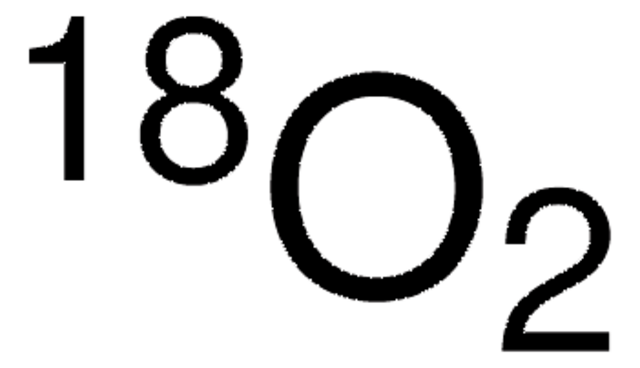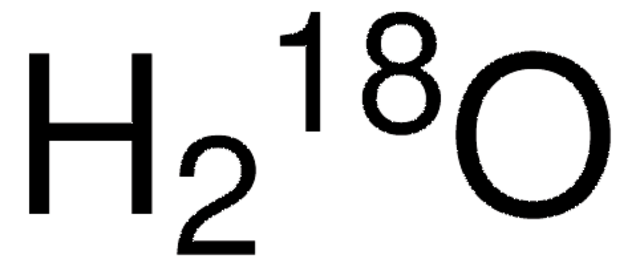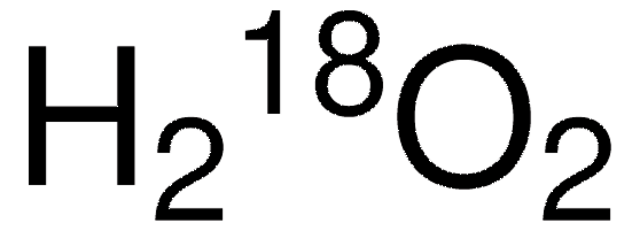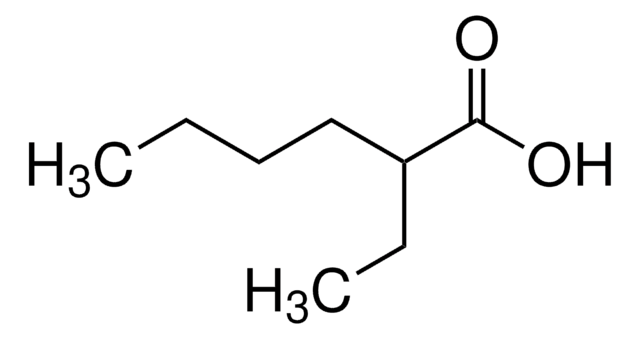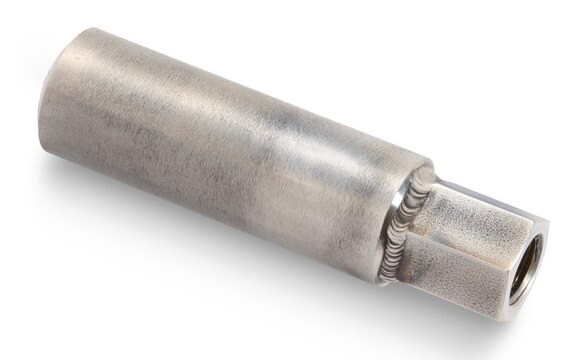All Photos(1)
About This Item
Linear Formula:
18O2
CAS Number:
Molecular Weight:
36.00
MDL number:
UNSPSC Code:
12142200
PubChem Substance ID:
NACRES:
NA.12
Recommended Products
vapor density
1.11 (vs air)
isotopic purity
99 atom % 18O
Assay
99% (CP)
form
gas
technique(s)
PET imaging: suitable
bp
−183 °C (lit.)
mp
−218 °C (lit.)
mass shift
M+4
SMILES string
[18O]=[18O]
InChI
1S/O2/c1-2/i1+2,2+2
InChI key
MYMOFIZGZYHOMD-XPULMUKRSA-N
Looking for similar products? Visit Product Comparison Guide
Related Categories
General description
Oxygen-18O2 is a naturally occurring stable isotope of oxygen. Natural abundance of 18O2 containing at least 99 atom % O-18.
Application
18O2 isotopic labelling was employed, in conjunction with time-of-flight secondary ion mass spectrometry, to characterize and elucidate the parts of the degradation mechanisms induced by molecular oxygen. Using 18O2 as a label, it is possible to study collagen degradation with this non-reutilized label and so avoid the large errors that are introduced by the recycling of other labels.
Oxygen-18O2 can be used to study the kinetic and functional analyses in photosynthesis research. It is used to estimate the role of oxygen in the vitamin-K dependent carboxylation reaction. Also used to measure the amount of oxygen produced by the etching a quartz tube with SF6 plasma.
Packaging
1 L quantity is packaged in a 450 mL carbon steel lecture bottle with brass CGA 110/180 valve. Nominal gas pressure at 21ºC is 20 psig for 1 L. This pressure is slightly above atmospheric pressure. Care must be taken when extracting this product from the cylinder.
All gas volumes are quoted at Standard Temperature and Pressure (STP) and not at Normal Temperature and Pressure (NTP). One STP Liter is 7.7% more gas than one NTP Liter.
Recommended products
Brass hose adapter Z146811 or brass body mini gas regulator Z513539 is recommended for 500 mL Sure/Pac cylinder (U.S only). For 1 L cylinder, either stainless steel control valve Z146951 or Z187224 is recommended.
PTFE sealing washers GCA inlet size 180 Z146994
PTFE sealing washers CGA inlet size 110 Z146986
PTFE sealing washers GCA inlet size 180 Z146994
PTFE sealing washers CGA inlet size 110 Z146986
hose barb
Product No.
Description
Pricing
regulator
Product No.
Description
Pricing
Signal Word
Danger
Hazard Statements
Precautionary Statements
Hazard Classifications
Ox. Gas 1 - Press. Gas Compr. Gas
Storage Class Code
2A - Gases
WGK
WGK 3
Flash Point(F)
Not applicable
Flash Point(C)
Not applicable
Personal Protective Equipment
dust mask type N95 (US), Eyeshields, Gloves
Choose from one of the most recent versions:
Already Own This Product?
Find documentation for the products that you have recently purchased in the Document Library.
Customers Also Viewed
Catherine Fenselau et al.
Journal of proteome research, 8(5), 2140-2143 (2009-04-03)
Enzyme-catalyzed 18O2-labeling offers a universal strategy for uniform labeling of all peptides from any kind of proteins, including post-translationally modified proteins. It is applicable to clinical samples with unrivaled sensitivity. This review discusses strengths and limitations, and advocates the separation
J A Molnar et al.
The Biochemical journal, 250(1), 71-76 (1988-02-15)
To explore the effects of growth retardation, caused by restricted protein intake, on collagen turnover in the whole skin, Sprague-Dawley rats (n = 20) were labelled with 18O2 and fed on either an adequate (18%) or a low (3%) lactalbumin
Dmitriy Shevela et al.
Frontiers in plant science, 4, 473-473 (2013-12-11)
Monitoring isotopic compositions of gaseous products (e.g., H2, O2, and CO2) by time-resolved isotope-ratio membrane-inlet mass spectrometry (TR-IR-MIMS) is widely used for kinetic and functional analyses in photosynthesis research. In particular, in combination with isotopic labeling, TR-MIMS became an essential
Sui So et al.
Physical chemistry chemical physics : PCCP, 16(45), 24954-24964 (2014-10-18)
β-Hydroxyperoxyl radicals are formed during atmospheric oxidation of unsaturated volatile organic compounds such as isoprene. They are intermediates in the combustion of alcohols. In these environments the unimolecular isomerization and decomposition of β-hydroxyperoxyl radicals may be of importance, either through
Our team of scientists has experience in all areas of research including Life Science, Material Science, Chemical Synthesis, Chromatography, Analytical and many others.
Contact Technical Service